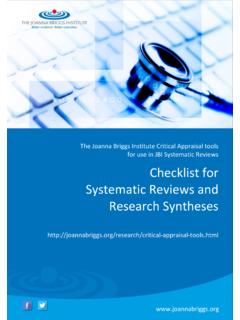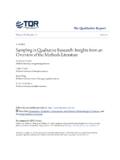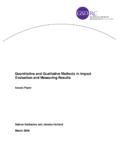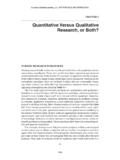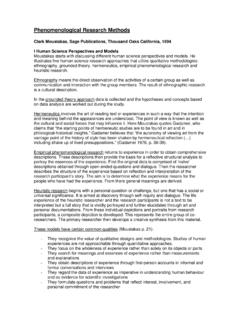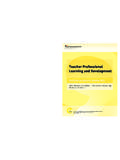Transcription of for use in JBI Systematic Reviews Checklist for ...
1 The Joanna Briggs Institute Critical Appraisal tools for use in JBI Systematic Reviews Checklist for qualitative research Joanna Briggs Institute 2017 Critical Appraisal Checklist for qualitative research 2 The Joanna Briggs Institute Introduction The Joanna Briggs Institute (JBI) is an international, membership based research and development organization within the Faculty of Health Sciences at the University of Adelaide. The Institute specializes in promoting and supporting evidence-based healthcare by providing access to resources for professionals in nursing, midwifery, medicine, and allied health.
2 With over 80 collaborating centres and entities, servicing over 90 countries, the Institute is a recognized global leader in evidence-based healthcare. JBI Systematic Reviews The core of evidence synthesis is the Systematic review of literature of a particular intervention, condition or issue. The Systematic review is essentially an analysis of the available literature (that is, evidence) and a judgment of the effectiveness or otherwise of a practice, involving a series of complex steps. The JBI takes a particular view on what counts as evidence and the methods utilized to synthesize those different types of evidence.
3 In line with this broader view of evidence, the Institute has developed theories, methodologies and rigorous processes for the critical appraisal and synthesis of these diverse forms of evidence in order to aid in clinical decision-making in health care. There now exists JBI guidance for conducting Reviews of effectiveness research , qualitative research , prevalence/incidence, etiology/risk, economic evaluations, text/opinion, diagnostic test accuracy, mixed-methods, umbrella Reviews and scoping Reviews . Further information regarding JBI Systematic Reviews can be found in the JBI Reviewer s Manual on our website.
4 JBI Critical Appraisal Tools All Systematic Reviews incorporate a process of critique or appraisal of the research evidence. The purpose of this appraisal is to assess the methodological quality of a study and to determine the extent to which a study has addressed the possibility of bias in its design, conduct and analysis. All papers selected for inclusion in the Systematic review (that is those that meet the inclusion criteria described in the protocol) need to be subjected to rigorous appraisal by two critical appraisers. The results of this appraisal can then be used to inform synthesis and interpretation of the results of the study.
5 JBI Critical appraisal tools have been developed by the JBI and collaborators and approved by the JBI Scientific Committee following extensive peer review . Although designed for use in Systematic Reviews , JBI critical appraisal tools can also be used when creating Critically Appraised Topics (CAT), in journal clubs and as an educational tool. Joanna Briggs Institute 2017 Critical Appraisal Checklist for qualitative research 3 JBI Critical Appraisal Checklist for qualitative research Reviewer Date Author Year Record Number Yes No Unclear Not applicable 1.
6 Is there congruity between the stated philosophical perspective and the research methodology? 2. Is there congruity between the research methodology and the research question or objectives? 3. Is there congruity between the research methodology and the methods used to collect data? 4. Is there congruity between the research methodology and the representation and analysis of data? 5. Is there congruity between the research methodology and the interpretation of results? 6. Is there a statement locating the researcher culturally or theoretically?
7 7. Is the influence of the researcher on the research , and vice- versa, addressed? 8. Are participants, and their voices, adequately represented? 9. Is the research ethical according to current criteria or, for recent studies, and is there evidence of ethical approval by an appropriate body? 10. Do the conclusions drawn in the research report flow from the analysis, or interpretation, of the data? Overall appraisal: Include Exclude Seek further info Comments (Including reason for exclusion) Joanna Briggs Institute 2017 Critical Appraisal Checklist for qualitative research 4 Discussion of Critical Appraisal Criteria How to cite: Lockwood C, Munn Z, Porritt K.
8 qualitative research synthesis: methodological guidance for Systematic reviewers utilizing meta-aggregation. Int J Evid Based Healthc. 2015;13(3):179 187. 1. Congruity between the stated philosophical perspective and the research methodology Does the report clearly state the philosophical or theoretical premises on which the study is based? Does the report clearly state the methodological approach adopted on which the study is based? Is there congruence between the two? For example: A report may state that the study adopted a critical perspective and participatory action research methodology was followed.
9 Here there is congruence between a critical view (focusing on knowledge arising out of critique, action and reflection) and action research (an approach that focuses on firstly working with groups to reflect on issues or practices, then considering how they could be different; then acting to create a change; and finally identifying new knowledge arising out of the action taken). However, a report may state that the study adopted an interpretive perspective and used survey methodology. Here there is incongruence between an interpretive view (focusing on knowledge arising out of studying what phenomena mean to individuals or groups) and surveys (an approach that focuses on asking standard questions to a defined study population); a report may state that the study was qualitative or used qualitative methodology (such statements do not demonstrate rigour in design) or make no statement on philosophical orientation or methodology.
10 2. Congruity between the research methodology and the research question or objectives Is the study methodology appropriate for addressing the research question? For example: A report may state that the research question was to seek understandings of the meaning of pain in a group of people with rheumatoid arthritis and that a phenomenological approach was taken. Here, there is congruity between this question and the methodology. A report may state that the research question was to establish the effects of counselling on the severity of pain experience and that an ethnographic approach was pursued.
